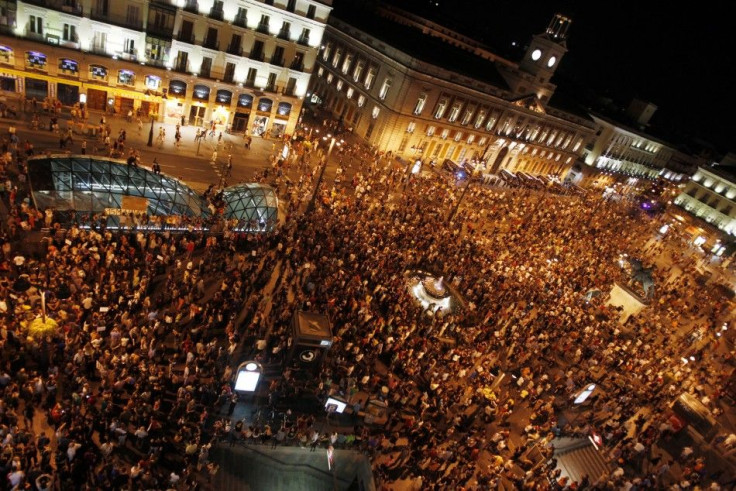Occupy Wall Street: Outrage! and the Movement's European Roots

At its onset, the Occupy Wall Street movement was designed to mirror the Arab Spring protests of 2011, in particular the regime-toppling demonstrations in Egypt's Tahrir Square. But despite the creators' intentions, Occupy has much more in common with a growing European unrest that started in France in 2006, then spread to England, Spain and across the continent.
The current Eurozone crisis has shown that the United States is not alone in its financial woes. Spain -- like Greece, Ireland and Portugal -- is massively in debt, and unemployment has risen to 20 percent -- the highest jobless rate in Europe. Nearly 50 percent of all young Spaniards out of work.
Spain's 15-M Movement
The 15-M Movement, also called the Spanish Revolution has been ongoing since May. Thousands of people have gathered in dozens of cities, demanding social and political reform.
In Madrid, where protestors have equated the national debt to embezzlement perpetrated by the government, Puerta del Sol square has become the focal point of the movement, much like Zuccotti Parkand now Washington Square Park have New York, with more than 2,000 people sleeping there on the first of 150 nights.
Like with Occupy Wall Street, the protests are organized using participatory democracy, and there is no organized leadership.
And the Occupy protestors would be encouraged to know that the 15-M Movement seems to be working. Prime Minister Jose Luis Rodriguez Zapatero has called for elections to be held four months ahead of schedule with hopes that a new government and fresh start will being to solve the country's economic catastrophe.
This is good news because it's what most Spaniards want, Popular Party leader Mariano Rajoy said at a news conference in July.
The Spain protests mirrored two movement that happened in France -- one in 2006 and one in 1968. They were focused on both meanings of the word occupation, with students and workers occupying Paris's universities in the name of unemployment and social and economic progress. The 2006 protests were primarily targeted on the controversial Equal Opportunity Law, a new employment bill that made it easier for employers to fire workers under 26 years old.
Additionally, much of Occupy's rhetoric can be found in a small, 2010 French book by Stéphane Hessel titled Time for Outrage! Hessel, whose impressive resume includes the Bilbao Prize for the Promotion of a Culture of Human Rights and working with Eleanor Roosevelt to edit the Universal Declaration of Human Rights, was a French resistance fighter in WWII who was tortured in Nazi concentration camps.
One Universal Theme Among Activist Groups: Speak Out Against Wealth Gap
In Time for Outrage! Hassel argues that it is time for France, and the world, to speak out against the expanding wealth gap in Western nations.
They have the nerve to tell us that the state can no longer cover the costs of these social programs (welfare, immigration). Yet how can the money to continue and extend these achievements be lacking today, when the creation of wealth has grown so enormously since the Liberation [of France], a time when Europe lay in ruins? Hassel writes.
It can only be because the power of money... has never been as great and as selfish and shameless as it is now, with its servants in the very highest circles of governments.... The gap between richest and poorest has never been so wide, competition and the circulation of capital never so encouraged.
It seems that an increasing number of people in the United States are hearing Hassel's message and are themselves getting outraged. Occupy Wall Street is still more about opening a dialog than about specific demands, but their points on the economy, the financial markets and unemployment are as loud as they are in Spain and were in France.
The New York Daily News, as well as other news sources, calls the protestors anti-capitalist, which is true of some of the occupiers, but isn't a fair label for the whole movement. Terms like anti-capitalist are not only inaccurate, but they rhetorically position the protestors to be anti-America, which is dangerous and false.
The leaderless anti-corporate movement, which The Daily News has also used, is a much better -- although not perfect -- descriptor.
As they struggle in the name of economic solidarity, the Occupy Wall Street protestors can be left with a final thought from Hassel:
You join the movement of history, and the great current of history continues to flow only thanks to each and every one of us.
© Copyright IBTimes 2024. All rights reserved.





















